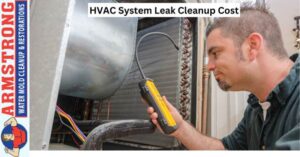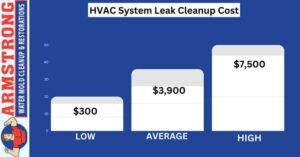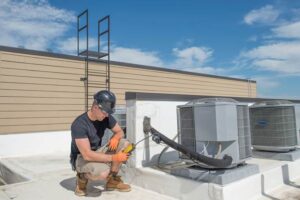
Is your HVAC system leaking away your comfort and money? Find out how much it costs to clean up the mess before it spirals out of control!
Leaking HVAC systems can wreak havoc on your home and wallet. Left untreated, leaks lead to higher energy bills, water damage, and costly repairs. But how much does it cost to fix the issue? Understanding HVAC System Leak Cleanup costs can help you budget smartly and avoid surprises.
Cost breakdown of HVAC System Leak Cleanup
| Service Type | Low Cost | High Cost | Average Cost |
| HVAC System Leak Cleanup cost | $300 | $7,500 | $3,900 |

How much is too much for HVAC leak cleanup? Discover the costs and what you\u2019re paying for!
| Service Type | Average Cost | What’s Included |
| HVAC Leak Inspection and Diagnosis | $100 – $300 | Initial inspection to identify the source of the leak, diagnostic testing, and a detailed repair estimate. |
| Refrigerant Leak Cleanup and Repair | $200 – $1,500 | Detection and sealing of refrigerant leaks, refrigerant recharge, and testing for system efficiency. |
| Water Leak Cleanup | $150 – $800 | Removal of water buildup, addressing mold/mildew risks, and repairing damaged components. |
| Duct Leak Repair | $300 – $1,000 | Sealing leaks in ductwork, insulation repair, and airflow optimization to restore system efficiency. |
| Comprehensive HVAC Leak Cleanup | $500 – $2,500 | Full-service leak cleanup, system testing, and replacement of any damaged parts to ensure long-term performance. |
| Preventative Maintenance Services | $150 – $500/year | Routine inspections, cleaning, and minor repairs to prevent future leaks and maintain optimal performance. |
Introduction
When it comes to maintaining your home’s comfort and efficiency, addressing HVAC System Leak Cleanup cost is crucial. The HVAC System Leak Cleanup charges vary depending on the extent of damage and services required. Knowing the HVAC System Leak Cleanup price can help you prepare for the cost of HVAC System Leak Cleanup and ensure your system runs smoothly without breaking the bank.
Types of HVAC system leak cleanup
HVAC Refrigerant Leak Cleanup
Refrigerant leaks occur when the cooling agent escapes due to cracks or damage in the system. Cleaning up involves locating the leak, sealing it, and recharging the system with refrigerant. This ensures proper cooling efficiency and prevents environmental harm caused by refrigerant emissions. Timely repair is crucial to avoid system breakdowns and higher repair costs.
Water Leak Cleanup
Water leaks often result from clogged condensate drain lines or malfunctioning evaporator coils. Cleanup includes removing water buildup, cleaning the affected area to prevent mold or mildew, and repairing or replacing damaged parts. Ignoring water leaks can lead to structural damage and air quality issues in your home.
Duct Leak Cleanup
Leaking ductwork causes air to escape before it reaches the intended areas, reducing system efficiency and driving up energy costs. Cleanup involves sealing the leaks, repairing damaged ducts, and cleaning the duct system to remove any debris or contaminants. This service restores proper airflow and improves energy efficiency.
Comprehensive HVAC System Leak Cleanup
Comprehensive cleanup addresses multiple types of leaks within an HVAC system, including refrigerant, water, and duct leaks. It involves a complete inspection, thorough cleaning, necessary repairs, and system testing to ensure everything operates optimally. This all-inclusive approach is ideal for older systems or those with multiple issues.
Condensate Line Leak Cleanup
Condensate line leaks occur when the drainage system becomes clogged or broken, leading to water overflow. Cleanup includes unclogging the lines, repairing any cracks, and ensuring proper drainage. This service prevents water damage and system inefficiencies caused by poor drainage.
Preventative HVAC Leak Maintenance
Preventative maintenance focuses on regular inspections, cleaning, and minor repairs to prevent leaks before they occur. This proactive approach includes checking refrigerant levels, cleaning drain lines, and inspecting ductwork to identify potential issues early, saving time and money in the long run.
Type of Leak Cleanup and its Average Cost Range
| Type of Leak Cleanup | Average Cost Range | Details |
| Refrigerant Leak Detection and Repair | $225 – $1,600 | Costs depend on the accessibility of the leak and the amount of refrigerant needed. |
| HVAC REFRESH | ||
| Water Leak Cleanup | $1,300 – $5,600 | Involves water extraction, drying, and restoration. Costs vary based on damage severity and water type. |
| EXPERT WATER REMOVAL | ||
| Duct Leak Repair | $150 – $450 | Includes sealing leaks and repairing damaged ducts. |
| HOMEGUIDE | ||
| Comprehensive HVAC System Leak Cleanup | $175 – $350 | Covers thorough inspection, cleaning, and necessary repairs. |
| ANGI | ||
| Condensate Line Leak Cleanup | $189 – $489 | Involves unclogging lines, repairing cracks, and ensuring proper drainage. |
Is your HVAC leak fixable or a budget-buster? Find out the costs and solutions today!
Causes of HVAC System Leaks
HVAC system leaks can occur due to several factors. Refrigerant leaks are often caused by corrosion in the coils or poor maintenance. Water leaks typically result from clogged condensate drain lines, dirty air filters, or malfunctioning evaporator coils. Duct leaks are caused by wear and tear, poor installation, or pest damage. Neglecting routine maintenance and inspections significantly increases the risk of leaks.
Effects of HVAC System Leaks
Leaks in an HVAC system can lead to reduced efficiency, higher energy bills, and uneven heating or cooling. Refrigerant leaks harm the environment and reduce cooling capacity, while water leaks can cause mold growth, water damage, and poor indoor air quality. Duct leaks result in air loss, compromising comfort and increasing operational costs. Addressing leaks promptly helps maintain system efficiency and prevent long-term damage.
Factors that impact HVAC system leak cleanup costs
| Factor | Impact on Costs |
| Size of the Leak | Larger leaks increase repair time and costs. |
| Location of the Leak | Hard-to-reach areas raise labor and tool costs. |
| Type of HVAC System | Complex systems require more time and parts. |
| Water Damage | Increased damage leads to higher cleanup costs. |
| Mold/Contamination | Mold removal adds significant expenses. |
| Age of the System | Older systems need more labor and parts. |
| Labor Costs | Higher local labor rates increase total costs. |
| Materials/Parts | Replacement parts add to overall expenses. |
| Urgency | Emergency services are more expensive. |
| Location | Costs vary based on regional rates and availability. |
HVAC System Leak Cleanup Cost vs other types of water damage Clean services cost
| Service Type | Low Cost | High Cost | Average Cost | |||
| Flood Damage Cleanup cost | $1,000 | $6,000 | $3,500 | |||
| Storm Damage Cleanup cost |
|
|
| |||
| Sewer Backup Cleanup cost |
|
|
| |||
| Plumbing Leak Cleanup cost |
|
|
| |||
| Roof Leak Cleanup cost |
|
|
| |||
| Appliance Malfunction Cleanup cost | $100 | $200 | $400 | |||
| Ice Dam Water Damage Cleanup cost | $1,500 | $3,000 | $5,000 | |||
| Hot Water Heater Leak Cleanup cost | $150 | $3,60 | $6,50 | |||
| HVAC System Leak Cleanup cost | $300 | $7,500 | $3,900 |
Wrapping up

HVAC system leak cleanup can range from $300 to $7,500, depending on the leak’s size, location, and the system’s complexity. Timely repairs are essential to prevent escalating issues like higher energy bills, water damage, mold growth, and system breakdowns. Understanding the costs involved helps you plan and avoid surprises. For expert guidance and to ensure your HVAC system is running efficiently, schedule a consultation with a professional today.
FAQs
Typically, $300 to $7,500, depending on the leak severity.
Leak detection, system repairs, water damage cleanup, and mold remediation.
Worn parts, clogged lines, poor maintenance, and system age.
Regular maintenance like cleaning filters and checking refrigerant levels.
Look for inconsistent temperatures, high bills, or water damage near the system.
